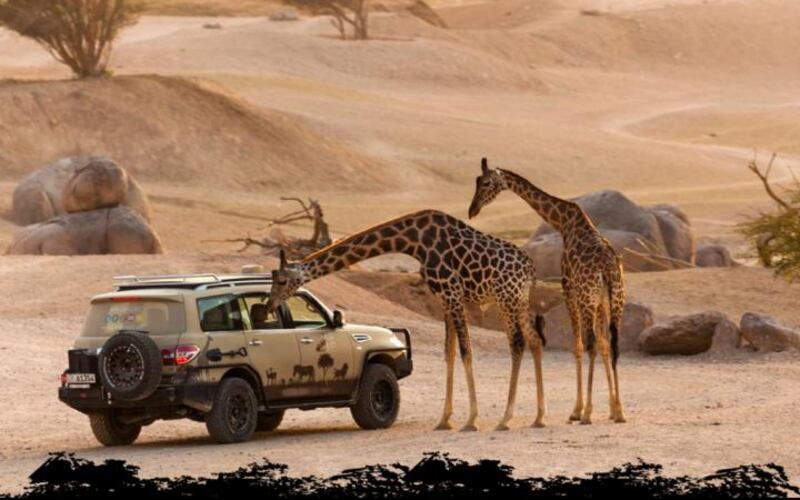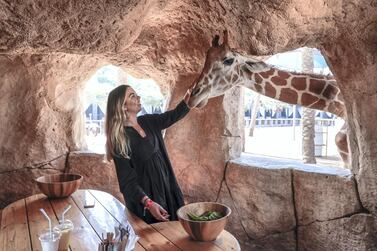Every week, we find two people with opposing (or at least different) views on a topic to discuss the day's big (and small) issues. This week, we're asking two of The National's biggest animal lovers whether there is a place for zoos in the 21st century.
Panna Munyal: The Al Ain Zoo website lists an interesting fact about the Arabian oryx: it was brought back from the brink of extinction thanks to a dedicated breeding programme conducted by the Phoenix Zoo in association with others, one of many such initiatives that conscientious zoos invest in.
Hayley Skirka: I didn't know that, that's interesting and I'm pretty sure it's not the first animal that has benefited from the conservation work that takes place in zoos around the world. But why does such conservation work need to take place in zoos, which are essentially entertainment venues for people?
PM: There's no denying that that's purely what they were – once. And while there still exist fly-by-night operators who are more interested in raking in profits, most world-class zoos not only have breeding and conservation programmes in place, but are also affiliated with academic institutes. Entertainment aside, zoos can provide an opportunity to educate people, especially youth, teach them more about animals and spark an interest in their well-being.
HS: I'd like to agree, but find it hard to swallow the conservation card that a lot of zoos play. It's an argument that's been created to appease people and it's not why zoos exist – they exist for human entertainment. Granted, some zoos have amazing programmes through which animals are well looked after, but that's also difficult to regulate. Earlier this year, the owner of St Edouard Zoo in Canada was jailed for animal cruelty despite having run the place for 30 years. And, in England last year, a zoo owner was charged after causing the deaths of more than 500 animals that were in his care.

As for education, do we really need to keep animals in captivity in order to learn about them or spark an interest? Hundreds of kids are still super-interested in dinosaurs or unicorns, despite the fact there are no cages offering an up-close look at these creatures.
PM: Zoos were created for human entertainment, yes, but that's quickly becoming secondary in ones that have animal welfare at their heart – from those in Singapore and San Diego to London, Prague, Berlin and Al Ain. And the "cages" are no longer cramped, unsanitised prisons, but rather species-specific enclosures that keep in mind each animal's need for space, greenery and water resources, with most even providing props and activities to keep the critters as entertained as its distant viewers.
HS: Many do have much better standards than ever before, but the primary function is still entertainment and selling tickets. Otherwise, why wouldn't the animals be kept in rehabilitation centres or open-space wildlife centres where they can roam more freely and have a choice about whether they are gawked at by members of the public on a daily basis? I think in this day and age, it's time to re-examine the existence of zoos. Who are we to decide animals are kept captive?
PM: In some cases, zookeepers are saviours. An unwell or endangered animal is unlikely to survive in the wild, but it can be cured by medical staff in a zoo. Highly qualified professionals and doctors are humans that such animals actually benefit from. Plus, several zoos do have wide, open spaces and most have enclosures fitted with private lairs for an animal to retreat to when it gets too hot or cold, or when it feels uncomfortable with the attention it receives during opening hours.
In fact, current zoo accreditation laws are super-strict when it comes to the size of an enclosure, not to mention food and hygiene quality. An unnatural habitat – with human intrusion – is not better than an animal’s natural habitat, I agree, but unfortunately the wild is not as wonderful a place as it’s made out to be anymore. Poachers exist, as does deforestation, as does climate change, all of which lead to hunted animals or a scarcity of food and water.
HS: I don't doubt for a minute that the people who work in zoos can be saviours and typically care greatly about the animals they look after. But if more resources were put into sanctuaries or animal rehabilitation projects then the qualified staff could do the same job there, without having to have commercial interests as their primary focus. Even in the best instances, zoos cannot begin to replicate natural habitats, as animals often can't fly, forage, hunt, choose a mate, form a pack, and so on, in captivity.
That said, I totally agree that the wild is not as wonderful a place as it used to be, something else that has stemmed from human selfishness and thinking we have “rights” over all the world’s creatures and places. It would be good if we could have a collective focus on efforts to restore animals’ natural habitats, than on scooping up sick or injured animals to fix them up just to stick them in a prison – albeit a large one that comes with a private lair.











